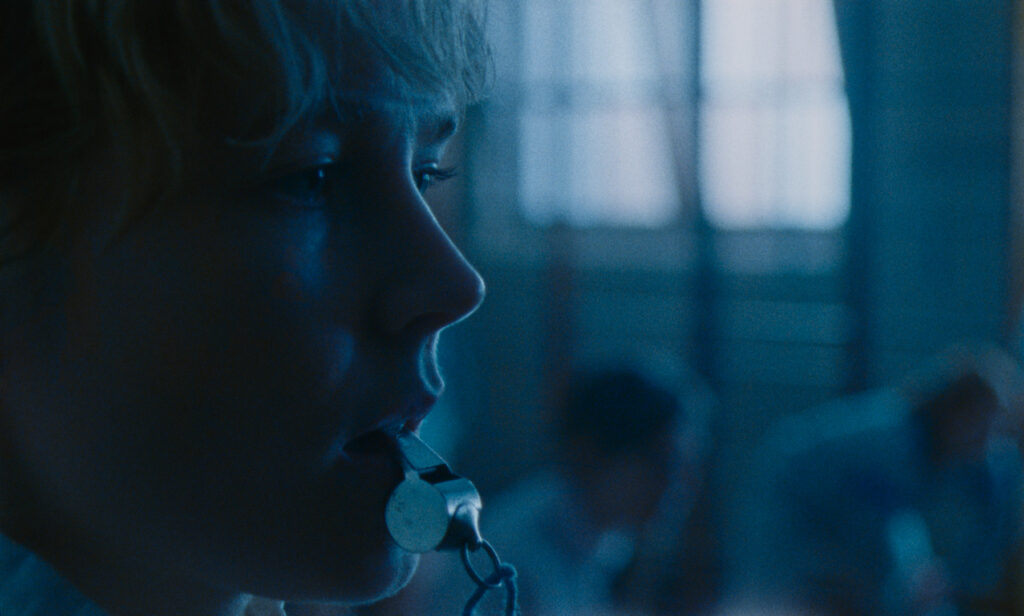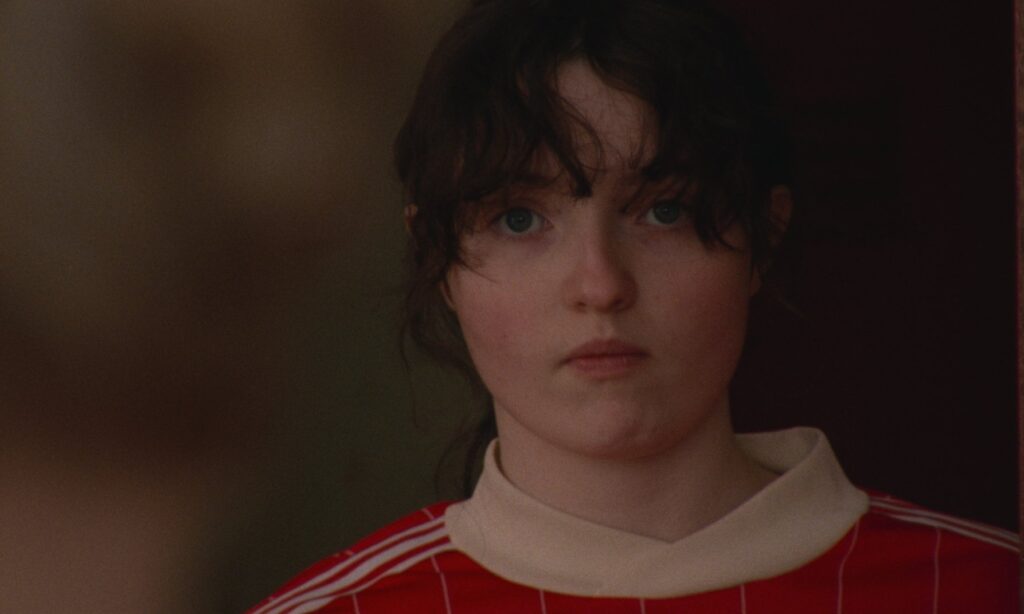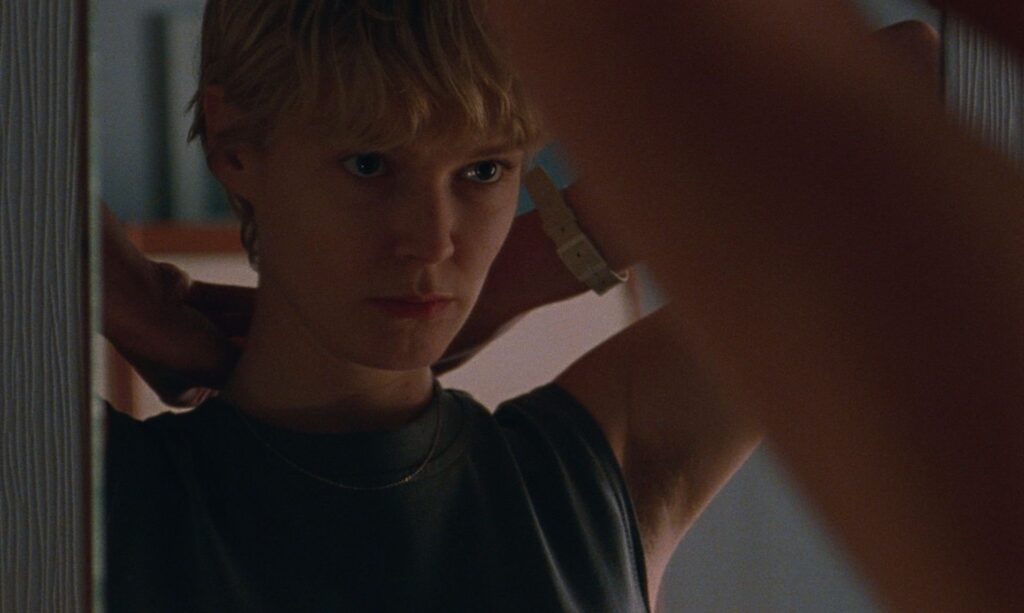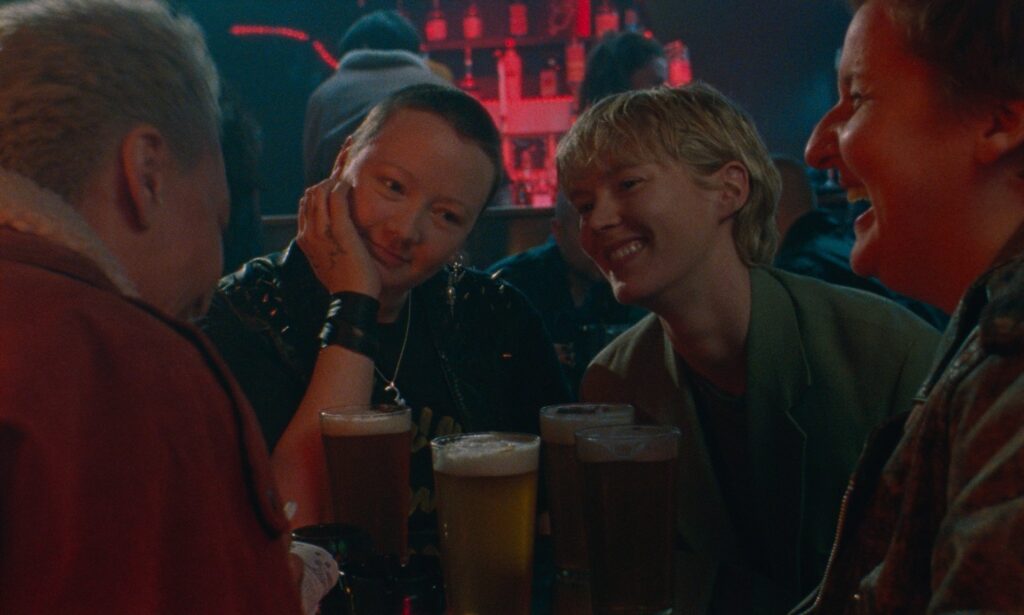Now showing: Blue Jean written and directed by Georgia Oakley
One of the best lesbian movies to come out in years, Blue Jean tells the story of a closeted lesbian PE teacher in Margaret Thatcher’s England, and the devastating impact of Section 28, which prohibited the “promotion of homosexuality” on her career and private life.
Written and directed by Georgia Oakley, and with deeply committed performances from the actors, especially Rosy McEwen, Kerrie Hayes, and Lucy Halliday, the film shows how not very much has changed since 1988 when it comes to the way in which conservatives use LGBTQ issues to weaponize their agendas.
Writer-director Oakley, 34, was born in the same year Thatcher’s Conservative government introduced the stifling clause, which was in effect from 1988 to 2000 in Scotland and from 1988 to 2003 in England and Wales. The law stated that a local authority “shall not intentionally promote homosexuality or publish material with the intention of promoting homosexuality” or “promote the teaching in any maintained school of the acceptability of homosexuality as a pretended family relationship”. While it was eventually repealed, it added to the sense of oppression and hopelessness in 1990s UK life, and foreshadowed measures implemented by Vladimir Putin and the Republican party here in the U.S.
Oakley told Queer Forty that the story germinated from her own experiences of coming out — and society’s somewhat naive expectations that coming out as a queer person only happens once.
“It’s actually a day-to-day thing that morphs as you get older,” Oakley explained. “I was thinking a lot about those things, and around that time I came across an article about Section 28 and some women who had been protesting about it, and I was struck by the fact that I didn’t know anything about the law despite the fact that it had been in place for 15 years and I had been a student for most of that time.”
Oakley, whose directorial debut Blue Jean has been nominated for some of the UK’s most prestigious awards (BAFTA Awards, London Critics Circle Film Awards), realized how much the law subliminally affected her own life, from the messaging she received as a child and teenager, to the cultural influences that were foisted upon viewers of British TV. For example, the dating game show Blind Date, which was hosted by someone as allegedly innocuous as entertainer Cilla Black, can be seen to enforce the mating rituals of heterosexuality for mass entertainment and indoctrination, and snippets of the show are used to powerful effect in Blue Jean.
“When I started thinking about Section 28 from the perspective of a teacher, I thought it was an opportunity to channel a lot of these things I’d been thinking about story-wise, and look at them through this heightened lens,” says Oakley.

And so she came up with the character of Jean, a PE teacher at a girls’ school in Newcastle, who has a mental health crisis as a result of compartmentalization and internalized homophobia. The result is a film that is assured and acutely well-observed and captures lesbian culture of the post-punk, AIDS era—pre ‘lesbian chic’—when communities of gay women mostly gathered underground and were divided in groups along class lines. The women of Blue Jean lead double lives and meet in pubs and collectives; they drink and smoke too much, and sex and furtive socializing are ways of coping with alienation and anxiety. But the elephant in the room is how to live openly without attracting contempt, and even worse, prosecution and violence. And so Jean’s carefully compartmentalized world cracks open when one of her teenage students, misfit Lois, shows up at the local pub and befriends Jean’s lesbian mates. Jean’s lover, Viv, who is a butch lesbian-feminist with an activist streak, expects Jean to mentor the girl but Jean is terrified of being outed and losing her job.

This story became a way for Oakley to channel her own “rage and inner fire” around certain issues that are still with us today, especially mainstream society’s anxieties around LGBTQ+ people and children.
Over the course of the four years it took to make the film, Oakley met with activists and politicians familiar with the period, and she researched Section 28, which she considered to be part of her education as a queer woman who lives in a country where the ruling party is Conservative.
The period details look and feels right because Oakley listened to first-hand accounts of gay women who lived through that period. Some of them even shared their diary entries, which described the basement bars and the housing collectives of that era, which in turn informed Oakley in her location scouting. “We had so much information given to us from those women, but also from photography of the time. I tried not to be too bound to realism because I knew the film would hopefully have the feeling of looking back into somebody’s memory more than being painfully accurate. I wanted it to be a subtly heightened vérité, not a documentary.”
Nevertheless, Oakley reveals that the school, for example—its sports hall and communal showers—was exactly as it had been in the 1980s, which proved to be triggering for the PE teachers who became advisers for the film. “Everybody had this all-body cringe because everybody had memories of what that had been like and different trauma and experiences that they brought to the space,” she says.
Throughout the film there is a pervasive sense of surveillance and danger, not just from the government, and from nosy hetero neighbors, but from the other women, too. Her female students are hostile, and without spoiling the plot too much, one of them, Siobhan (Lydia Page), stages an assault that ensnares both Lois and Jean in an incident that has consequences for them as queer women.
Oakley says there was a lot of ‘financing’ discussion around whether the character of Jean was too unlikeable and she has even heard pushback from women in the queer community who would prefer more clear cut role model representation.
“Luckily we had some champions who enabled me to feel empowered to tell a story about someone who made difficult decisions and looks at the queer experience in a way that isn’t sugar-coated. I did feel a lot of pressure at the time, at that moment—we were moving away from queer stories where everybody dies and nobody gets what they want to suddenly everything has to be Heartstopper-type, celebratory queer experience-type narratives.
“Although I believe it’s really important to have those stories available to us, I did feel very strongly as a filmmaker that I would not be robbed of the opportunity to explore some of my own angst. I really believe that all sorts of queer men and women should be depicted in film and they should be good, bad, and ugly and make good, bad, and ugly decisions.”
“One character should not be expected to carry the stories of everyone.”
Having said that, Jean is a pretty complex, well-rounded, believable creation and the performance by Rosy McEwen is astonishingly transparent and opaque at the same time, which is quite a feat, and the perfect embodiment of the film’s themes. I ask Oakley what it means to her when we see Jean dyeing her hair peroxide blond, almost ritualistically.

“For me there’s a feeling of Jean going into battle. Yes, she wears all of these masks in the different parts of her life but I feel like the hair-dying is something she does…there’s something about getting my hair cut short that is connected to my experience of being a queer woman, and it’s difficult to articulate, but that is something that I put into the character and into the film—the ways people react to her hair is something that’s taken directly from my own life.”
Blue Jean is now showing in New York with other cities to follow.






